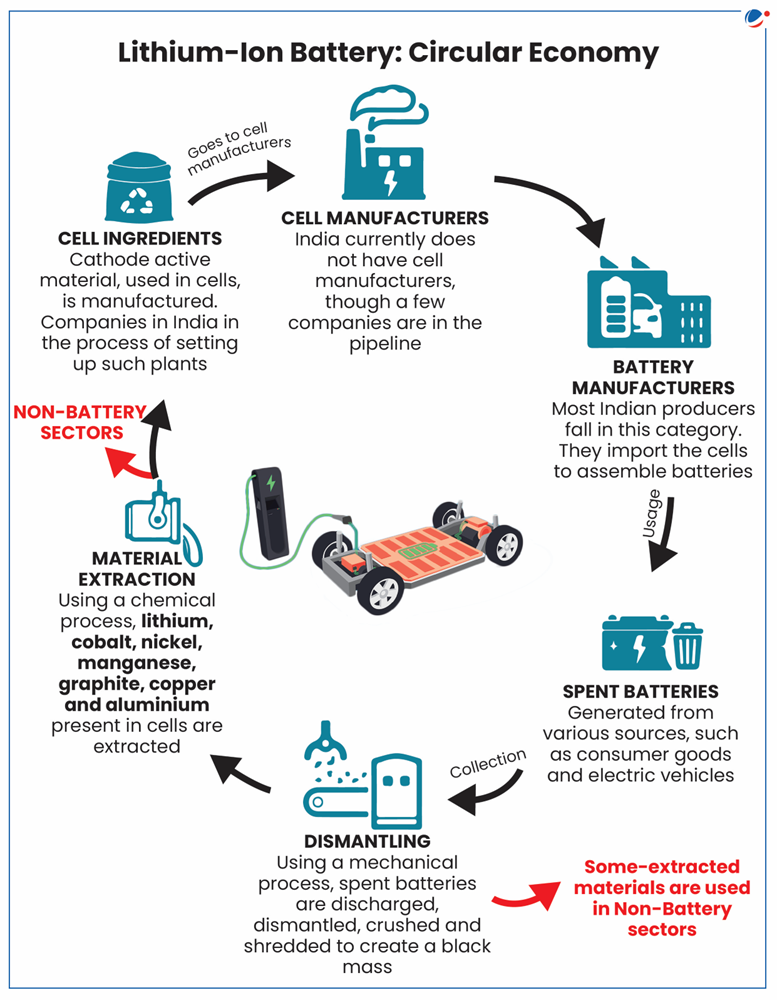Why in the News?
Recently, The Union Ministry of Environment, Forest, and Climate Change has recently made revisions to the Battery Waste Management Rules, 2022.
Need for Battery Waste Management
- Growth in Battery Use: The surge in the utilization of electronics, electric vehicles (EVs), renewable energy systems etc., has led to a notable rise in the demand for batteries. This also leads to the corresponding battery waste generation.
- For instance, in 2021, global annual demand for batteries was around 933 GWh, which is expected to grow to 5,100 GWh by 2030.
- Informal Recycling Practices: Currently, a very large share of used Lead Acid Batteries (more than 90%) is being recycled by informal recyclers which causes lead pollution.
- These recyclers generally do not follow prescribed environmental standards and regulations.
- Environmental Protection: Batteries contain toxic substances such as lead, cadmium, mercury, and lithium, which can leach into soil and water if improperly disposed of.
- Promotion of Circular Economy: Recycling and reusing batteries contribute to closing the loop of materials, reducing the environmental footprint of battery production, and fostering a more sustainable economy.
- Human Health: Improper handling and disposal of batteries can lead to human exposure to hazardous chemicals, resulting in health risks like neurological damage, respiratory problems, kidney failure, reproductive disorders, etc.

Current Governance framework of Battery Waste in India
- The Ministry of Environment, Forest and Climate Change, published the Battery Waste Management Rules, 2022, to ensure environmentally sound management of waste batteries under the Environment (Protection) Act 1986.
- The rules replaced the Batteries (Management and Handling) Rules, 2001.
- They were amended in 2023 and much recently in 2024.
- Key Provisions of the Battery Waste Management Rules, 2022
- Extended Producer Responsibility (EPR): Where the producers (including importers) of batteries are responsible for collection and recycling/refurbishment of waste batteries and use of recovered materials from wastes into new batteries.
- Centralized online portal: for exchange of EPR certificates between producers and recyclers/refurbishes.
- Mandatory recovery: the minimum percentage of recovery of materials from waste batteries.
- Polluter Pays Principle: Environmental compensation will be imposed for non-fulfilment of EPR target.
- Funds collected shall be utilised in collection and refurbishing or recycling of uncollected and non-recycled waste batteries.
Key changes introduced by the New Rules
Particulars | Battery Waste Management Rules, 2022 | Battery Waste Management (Amendment) Rules, 2024 |
Provision of Certificate for Waste Battery |
|
|
Action on violations and imposition of Environmental Compensation |
|
|
Way Forward
- Policy Support: For example NITI Aayog has suggested that,
- there should be provision of a separate licence for handling lithium ion batteries separate from electronic waste to reduce the minimum requirement for entry in recycling
- disposal of batteries in landfills should be made illegal.
- Incentivizing manufacturers: Incentives could be provided to manufacturers to meet recycling regulations, such as green taxes, in order to enforce extended producer responsibility.
- Incentivizing Customers: A Deposit Refund System can be implemented to provide incentives to customers to return batteries.
- Improving collection system: A separate collection agency could be established to help in streamlining both the collection and the recycling of batteries.
- Financing for R&D: Several research organizations can be funded to come up with commercially viable recycling processes with high recovery rates.







